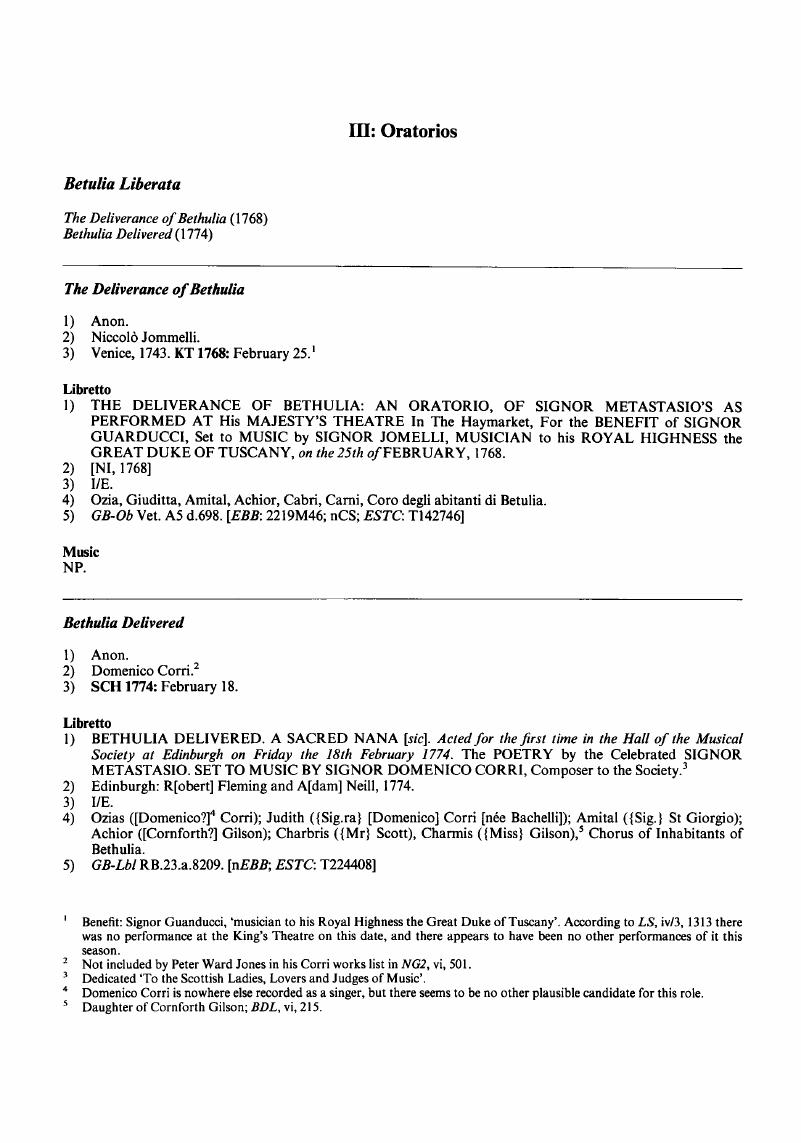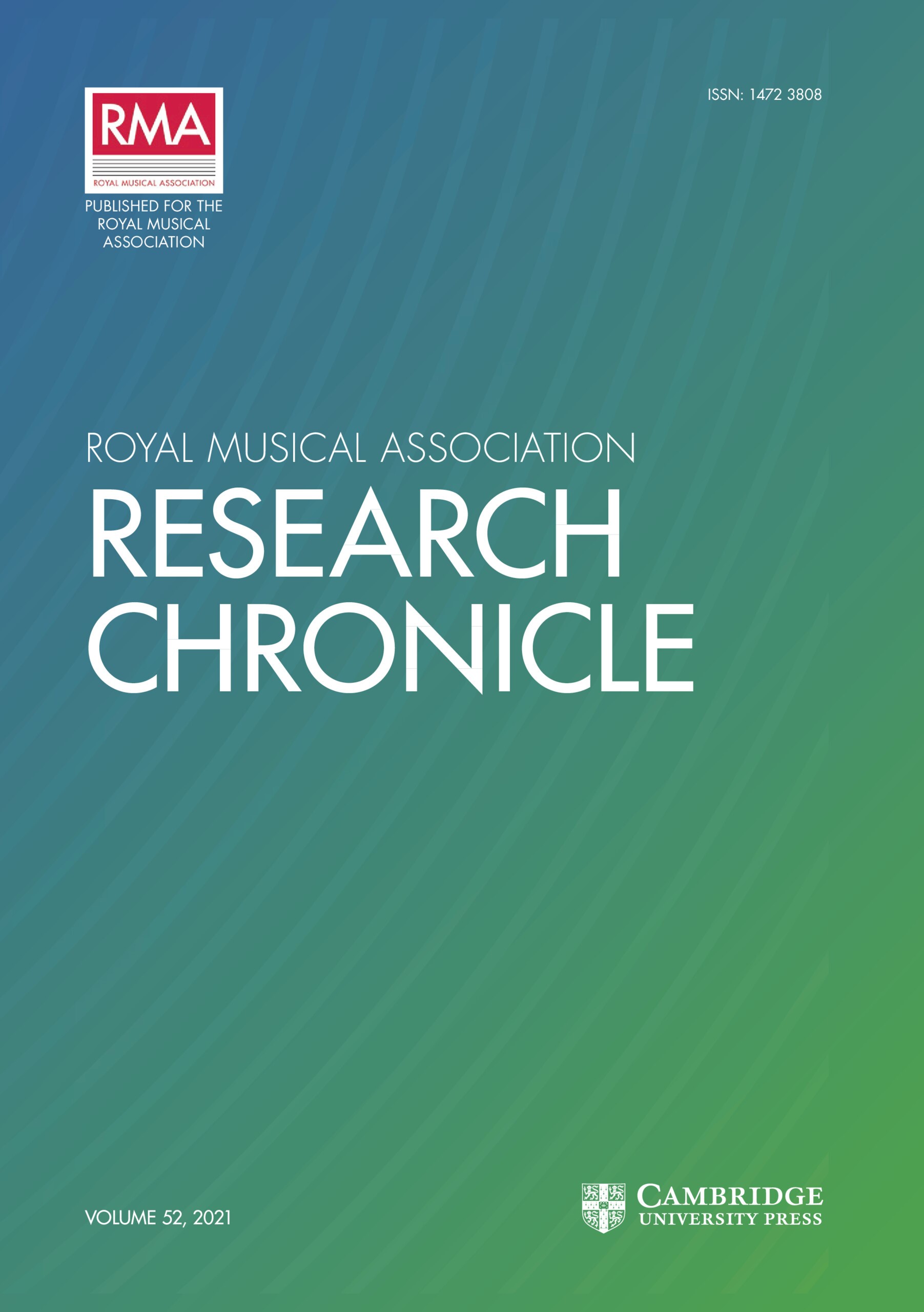No CrossRef data available.
Article contents
III: Oratorios
Published online by Cambridge University Press: 01 January 2020
Abstract

- Type
- Other
- Information
- Copyright
- Copyright © Royal Musical Association, 2007
References
1 Benefit: Signor Guanducci, ‘musician to his Royal Highness the Great Duke of Tuscany’. According to LS, iv/3, 1313 there was no performance at the King's Theatre on this date, and there appears to have been no other performances of it this season.Google Scholar
2 Not included by Peter Ward Jones in his Corri works list in NG2, vi, 501.Google Scholar
3 Dedicated ‘To the Scottish Ladies, Lovers and Judges of Music’.Google Scholar
4 Domenico Corri is nowhere else recorded as a singer, but there seems to be no other plausible candidate for this role.Google Scholar
5 Daughter of Cornforth Gilson; BDL, vi, 215.Google Scholar
6 GB-Ob Vet. A5 d.698; as The Deliverance of Bethulia.Google Scholar
7 GB-Lbl RB.23.a.8209; as Bethulia Delivered.Google Scholar
8 The text is set as a duet (see 2 ix below) rather than a chorus; see note 10 below.Google Scholar
9 Text from Part 1.Google Scholar
10 It is unclear just what this is, but it appears to be part of the proceeding duet. The chorus is specifically marked to sing after this text has been sung.Google Scholar
11 ‘A new Sacred Oratorio. Music entirely new composed by Bach. [Cecilia] Grassi being indisposed [Gasparo] Savoi will do her part’; LS, iv/3, 1463. This last comment suggests that the role must have been transposed.Google Scholar
12 [Giusto Ferdinando] Tenducci instead of [Gaetano] Guadagni; LS, iv/3, 1465.Google Scholar
13 Parts by [Polly] Barthelemon [née Young], [Cecilia] Grassi, Lelia Guglielmi, [Andrea] Morigi, [Gasparo] Savoi, and [Giusto Ferdinando] Tenducci; LS, iv/3, 1522.Google Scholar
14 GB-Cu S.721.d.70.4/4; also 1770 Edinbrugh: GB-En NG.1579.f.39 (1).Google Scholar
15 ‘Inscribed to Lady Georgiana Cavendish.‘Google Scholar
16 ‘First time of performing this Grand Musical Entertainment in England, and is judged by all conoisseurs to be the most exquisite piece of composition ever heard before’; LS, iv/2, 838.Google Scholar
17 Parts by [Christina] Passerini, [Cassandra] Frederick, [Teresa] Eberardi, [Gaetano] Quilici, and [Christiano] Tedeschino [Tedeschini?]. ‘By Desire. An Italian Oratorio in Two Acts. Words by Metastasio. Music by Jomelli. First time of performing this Grand Musical Entertainment in England, and is judged by all connoisseurs to be the most exquisite piece of composition ever heard before’; LS, iv/2, 838.Google Scholar
18 Dedicated to the members of the Dublin Catch Club.Google Scholar
19 Advertisement, GB-Cu MR460.d.75.1/8.Google Scholar
20 Dublin: GB-Cu MR460.d.75.1/8.Google Scholar
21 ‘Oratorio composed by Dr Arne’; LS, iv/2, 920.Google Scholar
22 ‘By Desire of several Persons of Distinction’; LS, iv/2, 1038.Google Scholar
23 Listed as GB-Lbl in BUCEM, but copy starts at number 9, page 439.Google Scholar
24 Milton's ‘Morning Hymn’ used to open Act 1.Google Scholar
25 ‘From the Italian of Metastasio, set to Music by Nicollo Piccini’; LS, iv/3, 1313.Google Scholar
26 Milton's ‘Morning Hymn’ used to open Act 1.Google Scholar
27 ‘Last Oratorio, but one this season. From the Italian of Metastasio. The Music by Sg Nicolo Piccini, the composer of La Buona Figluola [sic] with additional Chorusses’; LS, iv/3, 1467.Google Scholar
28 ‘Oratorio—taken from the Italian of Metastasio. Music by Piccini’; LS, iv/3, 1531. Elizabeth Harris records buying a libretto for this performance; see Harris, Elizabeth, London account book, 6 March 1771; Donald Burrows and Rosemary Dunhill, Music and Theatre in Handel's World: the Family Papers of James Harris 1732–1780 (Oxford, 2002), 626. No trace of a 1771 libretto has been found.Google Scholar
29 Michael Kassler and Philip Olleson, Samuel Wesley (1766–1837): a Source Book (Aldershot, 2001), 201.Google Scholar
30 US-PRu Ex 3609.37.Google Scholar
31 US-Ws 155–228q.Google Scholar
32 GB-Lbl R.M.5.e.6(4).Google Scholar
33 ‘Gently’ in 1762.Google Scholar
34 ‘Gabriel’ throughout in 1762.Google Scholar
35 Not specified, 1762.Google Scholar
36 An annotation suggests that this duet was omitted in performance.Google Scholar
37 Text present but not set in 1755.Google Scholar
38 Text present but not set in 1755.Google Scholar
39 GB-Ob Vet. A5 e.3801.Google Scholar
40 GB-Lcm XX.G.19/17.Google Scholar
41 Music by Pergolesi.Google Scholar
42 Music by Carissimi.Google Scholar
43 Music by Galliard.Google Scholar
44 Music by Pergolesi.Google Scholar
45 Music by Corelli.Google Scholar
46 Music by Pergolesi.Google Scholar
47 Music by Carissimi.Google Scholar
48 Music by Leo.Google Scholar
49 Music by Pergolesi.Google Scholar
50 Music by ‘Mr’ [J.C.?] Bach.Google Scholar
51 GB-Lbl Add. MS 34, 999.Google Scholar
52 US-SM K-D 57l (5).Google Scholar
53 ‘A Sacred Oratorio. Music—Jomelli’; LS, iv/3, 1458.Google Scholar
54 Parts—[Giusto Ferdinando] Tenducci [called Senesino], Savoi, Morigi, [Cecilia] Grassi, [Lelia] Guglielmi, [Polly] Barthelemon [née Young]. ‘The first part of an Oratorio; Music by Jomelli’; LS, iv/3, 1530.Google Scholar
55 No performances recorded for 1765.Google Scholar
56 This pasteover appears to have been much later; the firm traded from 1814 to 1831.Google Scholar
57 ‘Oratorio from the Italian of Metastasio. Never performed. The Music by Sg Jomelli. With additional Chorusses by Leo Graun, and others’; LS, iv/3, 1461.Google Scholar
58 US-Wc ML53.2.P28 J6 1765 (Case).Google Scholar
59 GB-Ob Harding D 2456 (5).Google Scholar
60 GB-Ob Harding D 2441 (7).Google Scholar
61 I-Vgc ROL.0472.19.Google Scholar
62 Text in 1770 and 1772, but not marked as accompanied recitative.Google Scholar
63 US-Ws 155228 (13).Google Scholar
64 Setting by Leonardo Leo.Google Scholar
65 Setting by Carlo Meli.Google Scholar
66 Setting by Graun.Google Scholar
67 Setting by Barsanti and Leo.Google Scholar
68 Setting by Richter.Google Scholar
69 Setting by Richter.Google Scholar


